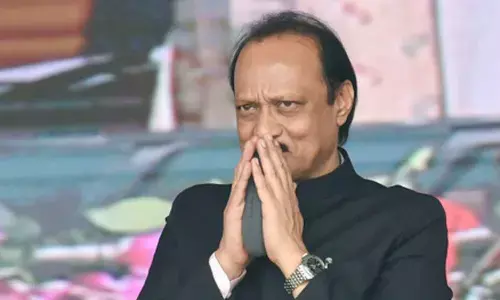Accord top priority to defence, internal security

Though the Constitution of India ordains responsibility of protecting sovereignty of India, the internal security, too, is equally important.
Though the Constitution of India ordains responsibility of protecting sovereignty of India, the internal security, too, is equally important. For the latter, unstinted support of the people is necessary.
In this context, outbursts of Pakistan's Prime Minister Imran Khan at the recent meeting of the UN General Assembly (UNGA) cannot be ignored though for diplomatic reasons our Prime Minister must have chosen to keep the 50 minutes monologue of his Pakistani counterpart on the fringe.
However, subsequent rejoinder by our side has appropriately dealt a solid blow to the baseless allegations and hollow threats by Pakistan.
Notwithstanding the trash irresponsibly thrown at India by Pakistan, one thing becomes quite clear that it derives maximum support from the Indian National Congress party, the original edition of which contains glorious chapters of patriotism and national integration.
The Pakistani Prime Minister freely used the name of Congress in a vain bid to buttress his irresponsible diatribes.
Indeed, this does not augur well for the country as its mention by the head of the enemy country in support of its false allegations before the global audience, lends some sort of credibility.
It is true that the Congress at home is not the real Congress of pre-independence era just as the BJP of today is not the same as the erstwhile Bharatiya Jana Sangh.
The people at home only know that these impersonating parties of the present day are just cashing in on the past glory of the genuine parties.
After losing badly at the recent hustings, Congress has been making last ditch attempts to survive. In its frantic moves it loses the sense of proportion. While nobody disputes its right to dissent, any words or action detrimental to national integration cannot be tolerated.
Sadly, such irresponsible behaviour of the Congress gets cajoled by other smaller parties and splinter groups whose only agenda is to weaken the country.
Therefore, in order to protect India from within and outside aggression immediate effective measures should be taken. This is the Constitutional obligation of the government and need of the hour.
Karimnagar CP, others sentenced
Justice Sanjay Kumar of Telangana High Court has sentenced the Karimnagar Police Commissioner V B Kamalasan Reddy, Assistant Commissioner of Police Tirupati and SHO Shashidhar Reddy to six months jail for repeatedly raiding Pushpanjali Country Resort despite a restraint order.
The court also imposed exemplary cost of Rs 10,000 and penalty of Rs 2,000 each for civil contempt.
Unfortunately, for the people in power, flouting court orders has become a routine affair. In a country whose Prime Minister describes himself as the 'Pradhan Sevak,' the officials in the administration feel false air of superiority in their minds.
Considering the blatant misuse of statutory powers by the people in authority and increasing contempt of court orders there is an urgent need to amend the present law of the Contempt of Courts Act so as to make it more stringent and effective.
Maintenance to divorced wife
The Supreme Court has reiterated that a wife who deserted her husband on her own and the husband was subsequently granted bail, is also entitled to maintenance under Section 125 of the Code of Criminal Procedure (CrPC).
In Dr Swapan Kumar Banerjee vs. State of West Bengal, a division bench while refusing to refer the matter to a larger bench held that the wife can decide as to when to file the petition for maintenance.
The court also rejected the contention of the husband that as the divorced wife was highly qualified from a reputed University, she would get an employment and be able to support herself.
No proof of her employment has been provided by the husband to this effect, the court observed while dismissing the petition.
Advocates' strikes illegal
Chief Justice Ramesh Ranganathan and Justice Alok Kumar Varma of the Uttarakhand High Court have ruled that strikes and boycotts of court by the advocates are illegal and such actions amount to misconduct.
The court further held that the Bar Associations passing resolutions for going on strike are also liable for stringent action.
The Bar Councils of the State concerned should initiate disciplinary action against those lawyers who resort to strike, boycott, gherao etc.
Observing that the advocates owe an obligation to the court and the clients, the court said that it is the duty of an advocate to protect the rights of the client guaranteed under Article 21 of the Constitution of India.
This is not the first time that a higher court has declared the agitations including strike and boycott by the Advocates as illegal.
Time and again different High Court's and even the apex court have vehemently expressed their displeasure for such activities by advocates and Bar Associations but there seems to be no end to such unconditional activities.
Some time back, the Law Commission of India had proposed statutory framework to end this menace but the same was met with stiff resistance from Bar Associations. Ultimately, the government had to put the proposal on back burner, if not in the cold storage.
Now it is high time that the issue is given a fresh look and appropriate amendments are made in the Advocates Act to ensure that the Advocates and their politically motivated associations are not able to indulge in the arm-twisting tactics and hold the litigants at ransom anymore.
Bombay HC on SC/ST Act
Justice A M Badar of the Bombay High Court has in a recent judgement ruled that to bring the offence of insult in the name of caste within the ambit of Section 3 (1) (s) of the SC/ST Act, the offence should have been committed not only in public place but also before an independent public witness.
Delivering the judgement in Salim Abdul Shaikh vs. State of Maharashtra, the court also held that in view of the fact that the witness was not an ' independent' witness, the bar on grant of anticipatory bail under Section 28 of the Act was not attracted.














